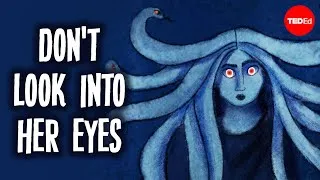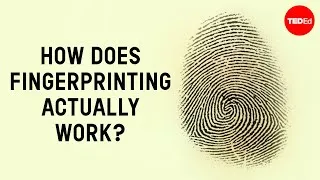请双击下面的英文字幕来播放视频。
翻译人员: Qiran Zhang
校对人员: Gabriella Hu
00:06
When we talk about English,
we often think of it as a single language
0
6864
3793
当我们谈到英语,我们常常想到
它是一种语言
00:10
but what do the dialects spoken
in dozens of countries around the world
1
10657
4340
但是那些遍布世界各国不同的方言呢
00:14
have in common with each other,
2
14997
2053
它们彼此间有什么相似之处
00:17
or with the writings of Chaucer?
3
17050
1930
或者说和乔叟(英国诗人)笔下的诗句有什么相似之处呢
00:18
And how are any of them related
to the strange words in Beowulf?
4
18980
4048
它们和《贝奥武夫》(一部古英语史诗)里让人看不懂的单词又有什么共同之处呢
00:23
The answer is that like most languages,
5
23028
2243
答案就是英语和大多数语言一样
00:25
English has evolved
through generations of speakers,
6
25271
3055
在数代运用这门语言的人中进化
00:28
undergoing major changes over time.
7
28326
2981
随着时间的流逝经历了重大的改变
00:31
By undoing these changes,
8
31307
2033
如果还原这些变化
00:33
we can trace the language
from the present day
9
33340
2439
我们可以将现代英语
00:35
back to its ancient roots.
10
35779
2624
追溯到它古老的源头
00:38
While modern English
shares many similar words
11
38403
2133
虽然现代英语,和源于拉丁语的罗曼斯语
00:40
with Latin-derived romance languages,
12
40536
2402
比如法语和西班牙语
00:42
like French and Spanish,
13
42938
1644
有很多单词是相似的
00:44
most of those words
were not originally part of it.
14
44582
3141
但是这其中绝大部分的单词起初并不属于英语
00:47
Instead, they started coming
into the language
15
47723
2548
而是在1066年诺曼入侵英格兰时
00:50
with the Norman invasion
of England in 1066.
16
50271
4816
才开始变为英语的
00:55
When the French-speaking Normans
conquered England
17
55087
2545
当说法语的诺曼人征服英格兰
00:57
and became its ruling class,
18
57632
2017
成为那里的统治阶级时
00:59
they brought their speech with them,
19
59649
2144
他们的语言也深深影响了英格兰
01:01
adding a massive amount
of French and Latin vocabulary
20
61793
3474
为英格兰当地的本土英语
01:05
to the English language
previously spoken there.
21
65267
3019
增添了大量法语和拉丁语词汇
01:08
Today, we call that language Old English.
22
68286
2763
现如今,我们称那时的英语为“古英语”
01:11
This is the language of Beowulf.
23
71049
2446
《贝奥武夫》就是用这种古英语写成的
01:13
It probably doesn't look very familiar,
24
73495
2114
古英语也许让人看起来觉得陌生
01:15
but it might be more recognizable
if you know some German.
25
75609
4306
但如果你懂一些德语,就会更加容易辨认它了
01:19
That's because Old English
belongs to the Germanic language family,
26
79915
3892
这是因为古英语属于德语的日耳曼语系
01:23
first brought to the British Isles
in the 5th and 6th centuries
27
83807
3788
起初是在5世纪和6世纪
01:27
by the Angles, Saxons, and Jutes.
28
87595
3584
被盎格鲁人,萨克逊人和朱特人带入不列颠群岛
01:31
The Germanic dialects they spoke would
become known as Anglo-Saxon.
29
91179
4722
他们所讲的日耳曼方言就是我们今天所知道的盎格鲁撒克逊方言
01:35
Viking invaders in the 8th
to 11th centuries
30
95901
3030
8世纪到11世纪时的维京入侵者
01:38
added more borrowings
from Old Norse into the mix.
31
98931
4012
又将更多古诺尔斯语加入到了英语之中
01:42
It may be hard to see the roots
of modern English
32
102943
2828
因为有太多从法语,拉丁语,古诺尔斯语
01:45
underneath all the words borrowed
33
105771
1863
和其他语言中借来的词汇
01:47
from French, Latin, Old Norse
and other languages.
34
107634
4104
所以也许很难从中找出现代英语的源头
01:51
But comparative linguistics can help us
by focusing on grammatical structure,
35
111738
5166
但比较语言学可以通过专注于语法结构
01:56
patterns of sound changes,
36
116904
1829
声音变化的模式
01:58
and certain core vocabulary.
37
118733
2442
以及某些核心词汇来帮助我们找出源头
02:01
For example, after the 6th century,
38
121175
2507
例如说,在6世纪之后
02:03
German words starting with "p,"
systematically shifted to a "pf" sound
39
123682
5329
德语中以“p”开头的单词的发音全都系统地转换成了“pf”
02:09
while their Old English counterparts
kept the "p" unchanged.
40
129011
4098
而与之相对应的古英语却没有发生变化
02:13
In another split, words
that have "sk" sounds in Swedish
41
133109
3868
在其他方面,那些具有“sk”发音的瑞典语词汇
02:16
developed an "sh" sound in English.
42
136977
3417
在英语中变成了“sh”的发音
02:20
There are still some English
words with "sk,"
43
140394
2842
英语词汇中还是有很多单词具有“sk”发音
02:23
like "skirt," and "skull,"
44
143236
2021
比如“裙子”(skirt)和“头骨”(skull)
02:25
but they're direct borrowings
from Old Norse
45
145257
2731
但是它们是从古诺尔斯语中直接借鉴来的
02:27
that came after the "sk" to "sh" shift.
46
147988
3793
这种借鉴发生的时间在从“sk”到“sh”的转换之后
02:31
These examples show us
47
151781
1929
这些例子告诉我们
02:33
that just as the various Romance languages
descended from Latin,
48
153710
3918
正如很多罗曼斯语言来源于拉丁语
02:37
English, Swedish, German,
and many other languages
49
157628
3975
英语,瑞典语,德语,以及很多其他语言
02:41
descended from their own common ancestor
known as Proto-Germanic
50
161603
4403
都来源于它们共同的祖先“古日耳曼语”
02:46
spoken around 500 B.C.E.
51
166006
2848
这种语言在公元前500年被广泛使用
02:48
Because this historical language
was never written down,
52
168854
3447
由于这种历史古老的语言从未被转化成文字
02:52
we can only reconstruct it
by comparing its descendants,
53
172301
3883
我们只能通过比较它的衍生语言来重建它
02:56
which is possible thanks
to the consistency of the changes.
54
176184
3118
而这可能要归功于这些衍生语言变化的一致性
02:59
We can even use the same process
to go back one step further,
55
179302
4369
我们甚至可以用同样的办法再往前跨一步
03:03
and trace the origins of Proto-Germanic
to a language called Proto-Indo-European,
56
183671
6070
追溯到古日耳曼语来源于古印欧语
03:09
spoken about 6000 years ago
57
189741
2181
这种古印欧语来自6000年前的东欧大草原
03:11
on the Pontic steppe
in modern day Ukraine and Russia.
58
191922
4590
也就是今天的乌克兰和俄罗斯地区
03:16
This is the reconstructed ancestor
of the Indo-European family
59
196512
4331
这就是重建的印欧语系的祖先
03:20
that includes nearly all languages
historically spoken in Europe,
60
200843
4528
囊括了历史上欧洲以及西南亚很大一部分地区
03:25
as well as large parts of Southern
and Western Asia.
61
205371
3340
所出现的所有语言
03:28
And though it requires a bit more work,
62
208711
2742
尽管需要多费点儿功夫,
03:31
we can find the same systematic
similarities, or correspondences,
63
211453
4437
我们仍从不同的印欧语系分支里有关联的词汇中
03:35
between related words in different
Indo-European branches.
64
215890
3974
找到系统的相似或者一致之处
03:39
Comparing English with Latin,
65
219864
2221
如果将英语和拉丁语相比较
03:42
we see that English has "t"
where Latin has "d",
66
222085
3605
我们会发现拉丁语中以“d”开头的单词,英语却以“t”开头
03:45
and "f" where latin has "p"
at the start of words.
67
225690
4038
拉丁语中以“p”开头的单词,在英语中却变成了“f”
03:49
Some of English's more distant relatives
include Hindi, Persian
68
229728
3953
而有些英语的“远亲”,包括北印度语,波斯语
03:53
and the Celtic languages it displaced
in what is now Britain.
69
233681
4428
以及波斯语,则被转换成了现在的大不列颠英语
03:58
Proto-Indo-European itself descended
from an even more ancient language,
70
238109
4660
古印欧语本身源于一种深知更加古老的语言
04:02
but unfortunately, this is as far back
as historical and archeological evidence
71
242769
5139
不幸的是,这种语言实在太古老
04:07
will allow us to go.
72
247908
2180
目前还没有历史和考古学证据能让我们了解它
04:10
Many mysteries remain just out of reach,
73
250088
2192
很多谜团都还无法被解开
04:12
such as whether there might be a link
between Indo-European
74
252280
3378
比如印欧语系及其他语系会不会
04:15
and other major language families,
75
255658
2184
与在先于它们出现在欧洲的语言特性
04:17
and the nature of the languages spoken
in Europe prior to its arrival.
76
257842
4680
有某种关联
04:22
But the amazing fact remains that nearly
3 billion people around the world,
77
262522
4896
但这仍然改变不了一个令人不可思议的事实,那就是全世界近30亿人
04:27
many of whom cannot understand each other,
78
267418
2562
尽管他们中的一些人听不懂彼此所说的语言
04:29
are nevertheless speaking the same words
shaped by 6000 years of history.
79
269980
6380
但他们却说着历经6000年历史淬炼的相同的词汇
New videos
关于本网站
这个网站将向你介绍对学习英语有用的YouTube视频。你将看到来自世界各地的一流教师教授的英语课程。双击每个视频页面上显示的英文字幕,即可从那里播放视频。字幕会随着视频的播放而同步滚动。如果你有任何意见或要求,请使用此联系表与我们联系。







